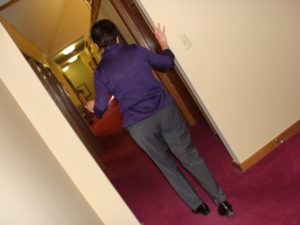Dizziness can make your life a living hell. If you suffer from dizziness or vertigo, you’re no stranger to the feeling of the world whirling around you, unsteadiness, and even nausea associated with this miserable condition. Several years ago while traveling through Europe, my husband had a bout of vertigo with nausea that literally left him crawling from the bed to the bathroom on his hands and knees for the better part of a week.
 The symptoms of mild dizziness can include feeling lightheaded, blurry vision and feeling unsteady. Sometimes it can be relieved by closing your eyes and holding still for a moment. In severe cases the dizziness, which is also called vertigo, can cause a sensation that the room is moving, an inability to stand, nausea, vomiting, and even fainting.
The symptoms of mild dizziness can include feeling lightheaded, blurry vision and feeling unsteady. Sometimes it can be relieved by closing your eyes and holding still for a moment. In severe cases the dizziness, which is also called vertigo, can cause a sensation that the room is moving, an inability to stand, nausea, vomiting, and even fainting.
In Chinese medicine, the ancients had two theories: No phlegm, no vertigo; and No deficiency, no vertigo. This suggests that there are two general causes of vertigo; excess in the form of phlegm, and a kind of deficiency, or depletion.
We mostly think of phlegm in all its grossness as something that accumulates in your lungs and causes you to cough, or causes you to blow your nose when you have a cold. However, in Chinese medicine, there is also something akin to “invisible phlegm” that can cause all kinds of symptoms like asthma, nausea, and in this case, dizziness. The phlegm is considered to be an obstruction, and is accompanied by chest tightness, nausea, and well…actual phlegm. It clogs things up in your head, obstructs clarity, and causes vertigo.
Dizziness or vertigo from deficiency may come from a couple of sources. First, when the nourishing coolant that is your body’s Yin is in short supply, Yang rises upward. Much like your car’s radiator overheating, this kind of dizziness tends to come with a little heat; a red face, red or irritated eyes, a bitter taste in your mouth, headache, and possibly tinnitus (ringing in your ears). Sometimes this kind of dizziness can be worse with stress, anger, or other strong emotions.
A second kind of deficiency that can make you dizzy is a depletion of energy and blood. The dizziness you experience comes from not having enough energy and blood to nourish your brain. Basically, you’re kind of wiped out, and it’s making you light headed, especially when you stand up or exert yourself. This kind of dizziness is usually not too severe, and you might also experience fatigue, a pale complexion, heart palpitations, and insomnia with it.
Finally, a third kind of deficiency that can cause you to be dizzy is a depletion of Kidney Essence. This is a very deep depletion at your body’s core, and may be accompanied by tinnitus, a sore and weak lower back and legs, deep fatigue, and poor memory.
So, can acupuncture and Chinese medicine help dizziness and vertigo? The answer is yes, in many cases depending on the cause. After completing a thorough exam and health history, a practitioner of Chinese medicine will likely combine acupuncture with an herbal formula for the best results. In most cases, especially with conditions of deficiency, dietary therapy would also be part of the healing process.
Beyond seeking out the help of a good practitioner of Chinese medicine, here are a few things you can do if you’re suffering from dizziness:
- Check your medications. Dizziness can be a side effect of certain medications, including some antihistamines, blood pressure medications, sedatives, tranquilizers, and many others. Review your medications with your doctor or pharmacist for side effects.
- Stay hydrated. Dehydration can cause you to feel lightheaded or dizzy. Make sure you’re getting enough water or other liquids during the day.
- Limit your intake of caffeine, alcohol, and tobacco. All have the ability to cause you to feel dizzy.
- Stand up slowly, as this is a prime cause of some episodes of dizziness.
- If you’re feeling dizzy, sit still and either close your eyes, or focus on one point until things calm down.
- Take a good, critical look at your diet. Are you getting enough protein, whole grains, vegetables, and fruit each day, or are you tearing open a package or a box for each meal? Diet can be incredibly important in the course of your dizziness, especially if it’s caused by being depleted.
- Always check with your doctor, especially if your symptoms are new. First of all, your doctor can rule out anything serious. Secondly, your dizziness may be easily treated. In some cases, dizziness is caused by something called Benign Paroxysmal Positional Vertigo (BPPV, or BPV), which can be alleviated with some simple therapeutic positional changes of your head.
Looking back over my husband’s episode of vertigo, I wasn’t an acupuncturist at the time, but I suspect that his diagnosis in Chinese medicine would have been a phlegm obstruction. His vertigo was severe, which is indicative of an excess condition; he was extremely nauseous, which can be associated with phlegm; and we had just completed a long flight and very smoky train ride, which irritated his sinuses. In the end, after about ten days, my husband was feeling better, and we hit the road for Switzerland, Italy, and Greece. It was an inauspicious start to a wonderful trip!



